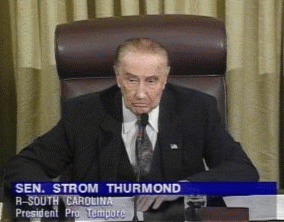Michael Fumento
Factual · Powerful · Original · Iconoclastic
Heat Turns up on Term Limits
October 22, 1992 · Michael Fumento · Investor’s Business Daily · Government"Eight is Enough!"
Or is it twelve?
The slogans may differ, but the purpose is the same.
Next month, voters in 14 states, including California, Washington, and Michigan, will vote on initiatives to limit the terms of federal office holders. Many of the initiatives limit state officials as well. Colorado already approved both state and federal limits in 1990.
While the initiatives vary on how much time an elected official can serve and which elected officials are covered, they all have the same purpose — "throwing the rascals out" before they get too comfortable.
It appears most of the initiatives will succeed. A recent national Field Poll showed that 63% of likely voters supported congressional term limits with 27% opposed. Polls in many of the individual states with initiatives also show overwhelming support for term limits.
"I’d be disappointed if we don’t win in 12 states," said James Coyne, former member of Congress and founder of Americans to Limit Congressional Terms.
But should they succeed?
Rep. Al Swift, D.-Wash., calls term limits "a quixotic tilt with windmills."
Said Swift, "What is happening right now is that people are very angry and you’ve had mushrooming out of the ground a bunch of mechanical solutions." He cited as examples the balanced budget amendment and other initiatives in addition to term limitations.

Rostenkowski, D-Ill.
Swift, who has pledged to step down from office after his next term, said, "I think the answer is to exercise rights in the Constitution and to get out and vote."
But, said Jeff Langan, spokesman for U.S. Term Limits, a group formed to advocate restricting congressional terms, in Washington: "Studies show that the longer congressmen are in office, the more fiscally irresponsible they become. The congressional culture today promotes concentration on reelection. In order to get re-elected, you bring pork projects home to the constituency or you hand out money through entitlement programs.
"It’s crippling the economy," he added. "With term limits, you will have more congressmen concentrating on fiscal responsibility and fewer on getting re-elected."
The Bush-Quayle campaign supports term limitations.
Said President Bush during the second presidential debate: "I strongly support term limits for members of Congress. I believe it would return the government closer to the people."
Similarly, Ross Perot told the debate audience, "We have got to reform government ... We need to do the reforms and the term limits," after which, he said, "good people will serve and then go back to their homes."
Bill Clinton’s position is not entirely clear. Last January, he said, "I won’t rule out term limits."
But in a July interview with the Boston Globe, he said, "I’m against term limits, because I think that it takes choices away from voters."
Opponents of term limits say the power of the incumbency has been overstated.
"An incumbent has a number of advantages but also a voting record which any challenger can use ... to come up with the most amazing attack ads," said Swift. "If people are generally dissatisfied, that works, if they’re not dissatisfied, it doesn’t."

The last time Strom got out and saw the real world, he was running for president in 1948 purely to oppose integration.
But, said Hank Brown, a freshman Republican U.S. senator from Colorado, "The problem is, it doesn’t work that way. There’s such an advantage for incumbents that very few of them lose."
In 1978, incumbents averaged $111,247 in campaign spending, according to James Coyne’s and John Fund’s book, Cleaning House: America’s Campaign for Term Limits. Challengers spent on average $75,015. By the 1990 election, incumbent spending averaged nearly $400,000, while that of challengers averaged only $109,000.
For whatever reason, turnover has declined dramatically in modern times.
Fund and Coyne note that, "In 1852, for example, only 36.2% of the members of the House of Representatives had served there previously," a number that has increased over the decades to a point where in 1988 "only six of the 405 House members lost their elections."
"This is equivalent to a milk cartel or cable TV cartel," Fund told Investor’s Business Daily. "They have structured the rules so that it’s very difficult for competitors to come in."
Although this scandal-plagued, recession-wracked year is different, he said, "For most years, (getting challengers) is like recruiting pilots for a kamikaze mission."
Further, Brown says, "Turnover is two-tiered. Certain districts turn over, but the people who run the place don’t change."
He notes that one member of Congress, Jamie Whitten, D.-Miss, has now been there 51 years, adding, "If you look at turnover in the top subcommittee positions, it doesn’t change."
Brown’s remarks echo those of President Truman, who said while president, "The 12-year limitation for members of the House and Senate would prevent the fossilization of the key committees."
This year, Congress will actually witness its most dramatic turnover since World War II, due in great part to the House check scandal and to redistricting. Some opponents of term limits point to this as evidence that the machine isn’t broke.
Not so, say proponents.
"This is basically a once-in-a-lifetime occurrence. If we get turnover," he said, "it will be for the wrong reasons, the wrong kind of turnover.
"I analogize it to Congress being a car out of control, careening down the highway, and suddenly stopping. And people would say, ’Look, the car works, it stopped,’ and I would say the tree stopped it."

Should this be turned into a permanent residence?
The ultimate goal of the initiatives is not so much to limit the delegation of individual states — a move that term-limit proponents concede could actually hurt the voters in the short run — but to send a large number of people to Congress serving under limited terms.
Once there, they could form an effective voting bloc to limit every representative’s term through a constitutional amendment.
Last year, Brown offered a constitutional amendment that would have effectively limited senators’ terms to two consecutive terms, but it was defeated 68-30. If enough senators’ terms are limited, he thinks he can get that 30 up to 51.
At that point, a constitutional amendment would be up to the state legislatures, two-thirds of which would have to give approval.
Constitutional Questions
Nevertheless, things may never get that far because, depending on which constitutional scholar you happen to be listening to, term limits imposed by state initiatives may prove to be a violation of the Constitution.
Stephen Glazier, a Washington attorney, has argued that while the Constitution has explicit age, citizenship, and residency requirements for members of Congress, those are viewed as minimum qualifications. States can impose further tests as well, he says.
Bruce Fein, a former Reagan administration attorney and currently a legal consultant, said that might be a possible "dictionary definition." But he noted that in 1969, Congress tried to keep Rep. Adam Clayton Powell from taking his congressional seat, and the Supreme Court ruled that Congress did not have the authority.
Glazier responds that, "The Tenth Amendment says that where the Constitution is silent, states have power and the federal government does not."
Therefore, just because Congress cannot impose limits does not mean that states cannot. Fein in turn responds that, if anything, this would be more strictly applied to the states than to the federal government.
It may not be coincidental that Glazier is a strong supporter of term limits while Fein calls term limit efforts "utterly unedifying and stupid."
Vic Kamber, president of the Washington political consulting firm the Kamber Group, says that the conflict over term limits is essentially one of liberal versus conservative.
A Kamber Group policy paper states that the term limits alliance "is composed mostly of right-wing ideologues," and "conservative Republican activists" along with other groups, although it later quotes one of the most staunchly conservative Republican members of Congress, Rep. Henry Hyde, Ill., in opposition to term limits.
Swift likewise said, "Right-wing Republicans are really behind all of this ... What it’s really about is getting the Democrats out of Congress."
But term-limit proponents say this is false. They point to such conservatives as former President Reagan who oppose term limits, and liberals like Ralph Nader and former presidential candidates Jerry Brown and Paul Tsongas who favor them.
Further, they say, the overwhelming support shown in polls for term limits belie the claim that it’s a liberal-conservative issue. There simply aren’t enough conservatives around to account for those numbers, they say.
A Liberal Supporter
One liberal actively working for the limitation side is Cleta Mitchell, an attorney with the Term Limits Legal Institute in Washington. Said Mitchell, "I’m a Bill Clinton supporter and I think he needs supporters to pass term limits if he’s to have a prayer of getting support for his programs."
"To me," said Mitchell, "it’s very democratic, both small ’d’ and large ’D’, to have offices belong to people rather than the office holders."
It doesn’t bother Mitchell that most of those being tossed will be liberal Democrats.
"What have they done for any of the causes they supposedly espouse?" said Mitchell. "Democrats in Congress have become the party of government instead of the party of the little people."
On some issues, both sides make strong arguments. Term-limit supporters say that Washington lobbyists, along with the media and incumbents, comprise their only real opposition. Lobbyists, they say, don’t want to lose years’ worth of investment.
But Kamber counters: "A lot of lobbyists will publicly say they oppose term limits. But lobbyists will gain in the process because they will become more important than members of Congress, who will be just passing through. Unless you have restrictions to one term, candidates will be beholden to lobbyists."
Fund, however, said, "The real problem isn’t that faces don’t change, it’s that they all start thinking alike" once they’ve been in Congress for too long.
Kamber added, "(Term limits) don’t solve any of the problems ... Term limits don’t get rid of check bouncers, they don’t get rid of the deficit, they don’t balance the budget. I’m surprised they haven’t said it’s going to get rid of dandruff and cirrhosis of the liver."
"The balanced budget amendment is clearly more significant," agrees Brown. "But this will change the whole perception of public service at the federal level."
Fund adds, "Term limits are not a substitute or panacea for other reforms."
Nevertheless, he says it could be a cure for one of the biggest problems that ails Congress, that of lack of experience outside of the public sector.
An Investor’s Business Daily analysis of Congress found that while 40% of the members are attorneys, few have true business backgrounds and even fewer of these are found in leadership positions.
Kamber and other opponents also worry that term limits would strengthen the bureaucracies.
With term limits, said Kamber, "Bureaucrats become very powerful. The permanent government of Washington becomes the power because they’re the experts, they have the knowledge, the power, and the money. Every year, 25,000 pieces of legislation are introduced in Congress and 2,000 pieces voted on. You have to rely on who’s out there."
"The government of Washington that will stay here will become much more powerful than they are today," he said.
’A Devil’s Deal’

Forty percent of congressional members are lawyers.
Fund says fresh congressmen wouldn’t tolerate such a thing. "I think Congress has made a devil’s deal (with the bureaucracy) to the effect of: ’We get a lifetime seat in Congress, and you get to run the show.’"
Whether that’s the case remains to be seen — and very well may be seen, since even Kamber despairs of stopping the onslaught of anti-incumbency that’s sweeping the nation this year.
"My only concern is a last-minute media barrage," said Pete Schabarum, chairman of Citizens for Term Limits in Los Angeles, which put the California initiative for term limits on the ballot.
"But as goes California, hopefully the rest of the country will go on term limits," he added. "I’m not terribly impressed with some of the trends California has set in recent years, but I hope this is a trend-setter."
